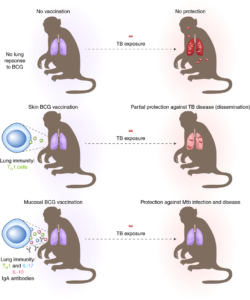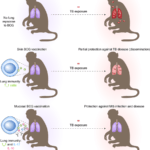
Vaccine-induced protection against Mtb infection and tuberculosis is dependent on mycobacteria- specific immune responses at the site of infection. (Source Scriba & Nemes, 2019)
One of the suggested pitfalls of intradermal (id-) BCG vaccination is the inability to induce robust mucosal immunity. Researchers hypothesise that BCG vaccination at the site of infection (lung mucosal (muc-)) may overcome this pitfall by inducing robust mucosal immunity. Researchers from Netherlands aimed to determine the kinetics and effect of either id- and lung muc-BCG vaccination against repeated low dose Mycobacterium tuberculosis (Mtb) challenge.
Both id- and muc- BCG vaccination induced Mycobacterial-specific CD4+ T cell responses. Upon Mtb low dose challenge, muc-BCG vaccination significantly delayed induction of M.tb-specific IFN-γ producing CD4 T cells compared to id-BCG vaccination. This finding was illustrated by both slower IFN-γ release assay conversion rates and lower levels of CFP10-ESAT6-specificIFN-γ producing CD4 T cells post conversion. Additionally, muc-BCG vaccinated macaques exhibited lower lung and lymph node inflammation and pathology, as well as lower bacterial load. Interestingly 8 weeks into the Mtb infection phase, none of the muc-BCG vaccinated macaques had detectable bacterial load in bronchoalveolar lavage fluid (BALF). This suggests muc-BCG vaccination induced lung mucosal immunity prevents establishment of sustained Mtb infection.
Polyfunctional profiles in responses to viral infections are synonymous with increased T cell mediated protection. Whether this is also true for mycobacterial immunity has not been determined. muc-BCG vaccination induced higher proportions of lung mucosal Th1 and Th17 cytokine producing CD4+ T cells than id-BCG vaccination. Surprisingly, induction of IL-17 and Il-10 was only observed in response to muc-BCG vaccination but not id-BCG vaccination nor M.tb challenge. Interestingly, no difference was observed between muc- and id-BCG vaccination induced systemic immunity.
In summary Dijkman et al., identified Il-17A and IL-10 production by CD4+ T cells in BALF as a potential correlate of protection. Where as Th1 CD4+ T cells predominantly after Mtb challenge were associated with tuberculosis disease and a potential correlate of disease progression.
Journal Article: Dijkman et al., 2019. Prevention of tuberculosis infection and disease by local BCG in repeatedly exposed rhesus macaques. Nature Medicine.
Article by Cheleka AM Mpande
